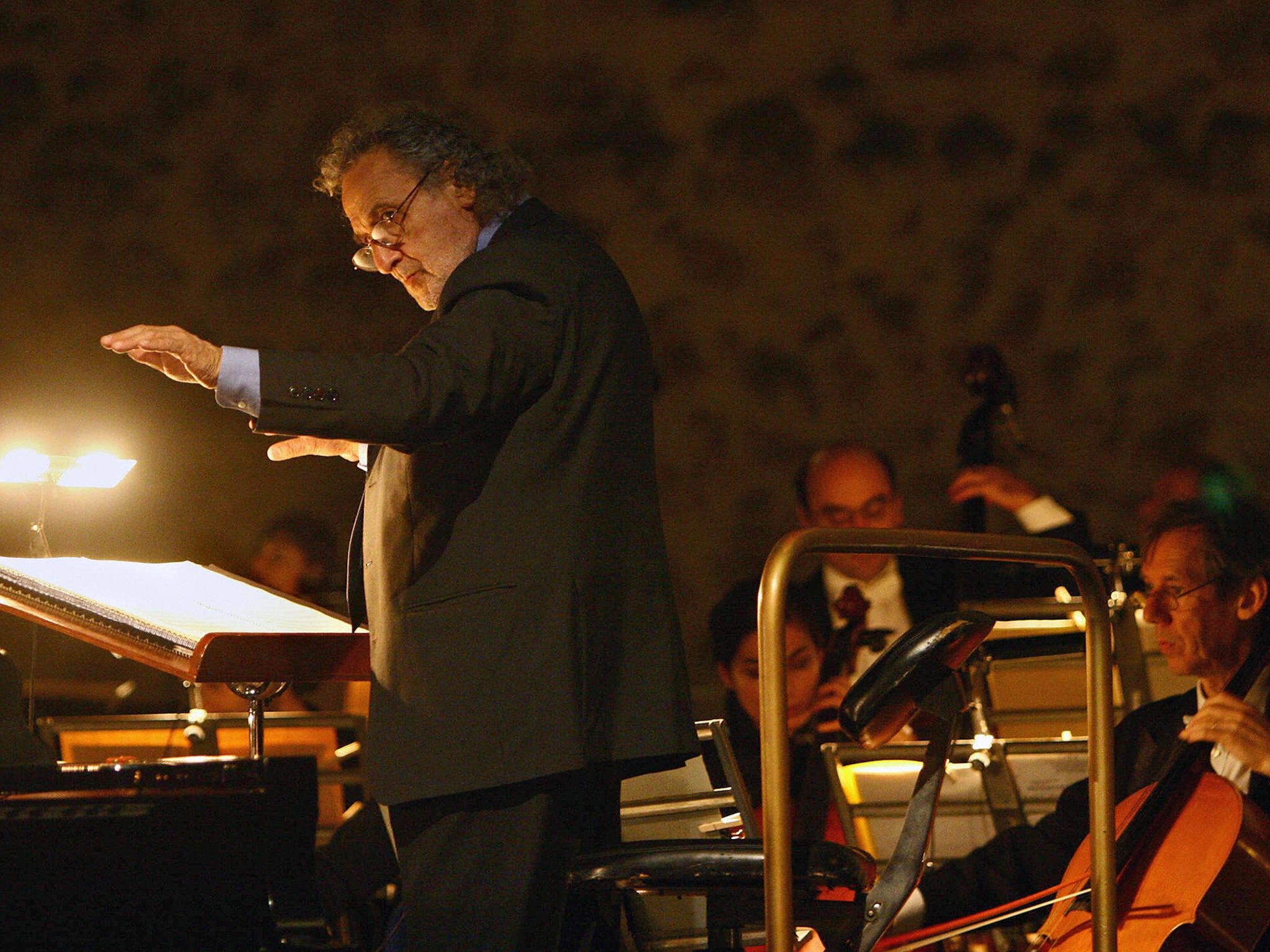Luis Bacalov: Oscar-winning composer of Il Postino and spaghetti westerns who worked with Fellini and Tarantino
Born in to a Jewish family in Buenos Aires, he emigrated to Italy where he established himself as a B-movie film composer who also worked with cinema’s greats

Luis Bacalov was the Argentine-born composer and pianist whose lilting score for the 1994 film Il Postino earned him an Oscar. His ominous guitar melodies for dozens of Italian crime movies and spaghetti westerns were used in films by Quentin Tarantino.
Bacalov, who has died aged 84, was principal conductor of the Orchestra della Magna Grecia in Taranto, Italy.
His scores for blood-splattered B-movies were complemented by works for the leading Italian directors Federico Fellini and Pier Paolo Pasolini, orchestral compositions inspired by the Catholic Mass and Italian prog rock.
Bacalov was born near Buenos Aires but spent nearly all his working life in Italy, where he incorporated a twist of tango into works.
Il Postino featured a gentle melody on the accordion-like bandoneon. The film’s international success introduced Bacalov to a mass audience that had eluded him for much of his career.
“Bacalov was a solid craftsman who could work in any genre,” said film-soundtrack historian Jon Burlingame, pointing out two of the composer’s signature scores – We Still Kill the Old Way (1967), in which Bacalov counterpointed the film’s mobster violence with “a haunting theme for piano and strings”, and his “lighthearted, jazzy and fun” soundtrack for 1980 Fellini film City of Women.
Bacalov’s Oscar win, Burlingame said, “ushered in a new era of foreign-born composers winning Academy Awards”, including Gabriel Yared (Lebanon), Tan Dun (China), Gustavo Santaolalla (Argentina) and Dario Marianelli (Italy).
Though he was often overshadowed by his friend Ennio Morricone, whose electric guitars and whipcrack percussion came to define the spaghetti western sound, Bacalov composed some of the most memorable tracks of Italy’s 1960s and 1970s western filmmaking boom.
His title song for Django (1966), a Franco Nero movie that was so bloody it was banned in England for nearly three decades, featured what director Tarantino later described as a “quasi-Elvis style” vocal part from Rocky Roberts: “(Django!) Django, have you always been alone? (Django!) Django, have you never loved again?”
The song was one of three by Bacalov that Tarantino used for Django Unchained (2012), a revisionist western that starred Jamie Foxx as a revenge-seeking former slave loosely inspired by Nero’s character of the same name.
Tarantino, fond of eclectic soundtracks, had previously used a pair of Bacalov’s songs for his Kill Bill movies.
“I’ve always loved this song,” Tarantino told the Los Angeles Times in 2012, describing his affection for Django. “I have to say, when I came up with the idea to do Django Unchained, I knew it was imperative that I open it with this song as a big opening credit sequence … Any spaghetti western worth its salt has a big opening credit sequence. In fact, if it doesn’t, I don’t really want to see it.”
Luis Enríquez Bacalov (his middle name is sometimes spelled Enrique) was born in San Martin on 30 August 1933. His family were Bulgarian Jews who had emigrated at the turn of the century. He began playing the piano as a five-year-old, studying under Daniel Barenboim’s father, Enrique.
Bacalov was a radio and television composer in Colombia before moving to Italy in 1959, where he worked as an arranger, composer and pianist for singers such as Gianni Morandi, Rita Pavone, Claudio Villa and the red-haired chanteuse Milva.
On-screen, he had his first major success with the score for Pasolini’s The Gospel According to St Matthew (1964). The film drew its dialogue from the Bible and featured an insistently anachronistic soundtrack – including a Congolese interpretation of the “Gloria” of the Latin Mass, arranged by Bacalov – that was nominated for an Academy Award.
Bacalov continued composing into his eighties, reuniting with Il Postino director Michael Radford to write the score for the romantic comedy Elsa & Fred (2014). At the same time, he faced a years-long legal battle over his acclaimed melody to Il Postino.
The song’s opening bars seemed to mirror those of “Nelle mie Notti” (”In My Nights”), a popular 1974 song by Bacalov’s former collaborator, Sergio Endrigo, who sued him for plagiarism. Bacalov acknowledged the resemblance but denied plagiarising, comparing the songs’ relationship to that of a Mozart sonata and a reworking by Verdi.
“Fortunately, I’m capable of writing 100,000 to 500,000 pieces in real time because God gave me this gift,” he told Reuters in 1996. “Why would I need to copy someone else?”
Bacalov at one point organised a news conference in which Morricone insisted the songs were not “the same”, and courts in Rome initially ruled in the composer’s favour. On appeal, however, a court found in favour of Endrigo, who demanded about $6m (£4.5m) in restitution.
Legal wrangling continued until 2013 – five years after Endrigo’s death – when Bacalov acknowledged using motifs by Endrigo and reached an out-of-court settlement with the singer-songwriter’s family.
“There are many fantastic musicians but not a lot who have the feeling and approach to apply that to film,” Bacalov told The Hollywood Reporter in 2002, describing the difficulties of his craft. “It’s sort of a sixth sense.”
Luis Bacalov, born 30 August 1933, died 15 November 2017
© The Washington Post
Join our commenting forum
Join thought-provoking conversations, follow other Independent readers and see their replies
Comments
Bookmark popover
Removed from bookmarks